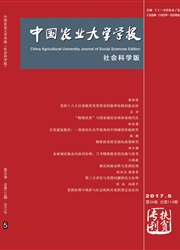

 中文摘要:
中文摘要:
村集体土地成员权的认定一直存在着政府法律政策的逻辑和乡土逻辑的争论.文章运用发展社会学中行动者导向方法中的社会界面视角,将国家干预、社区和社区成员之间的动态互动整合起来,研究新一轮集体林权改革中湖南S村如何认定成员权的问题.以户口为基础、“人人有份,机会均等”是成员权认定的基础原则,它实现了国家逻辑和地方逻辑的融合,得到了政府、社区和基层行动者的普遍认可.基层行动者利用社区作为社会文化共同体具有的文化认同、社会关系功能,推动了成员权认定的复杂化和多样化.政府在维护公平正义原则和村民自治的基础上,要加强对成员权问题的调节处理机制建设,而非去制定完备的标准.
 英文摘要:
英文摘要:
There has been an argument between the state logic and local logics of the membership right definition of village collective lands. On the perspective of social interface of the actor-oriented approach in development sociology, this paper analyzed how S village in Hunan Province defined membership rights in the collective forest tenure reform based on under- standing the interactions among state policies, the community, and local actors. The household registration (Hu Kou) basis and equality principles were foundation of the practice of the membership right definition, integrating the state logic and lo- cal logics, as well as accepted by the government, the community and the local actors. Moreover, the community with its social function of cultural identity and social relation used by local actors brought complexity and diversity of the member- ship right definition. Hence, it was essential for the government to play a vital role in safeguarding fairness and justice con- ditions of villager autonomy, and strengthening the mediation and settlement mechanism of membership right problems, rather than set up a unified standard.
 同期刊论文项目
同期刊论文项目
 同项目期刊论文
同项目期刊论文
 Understanding indigenous knowledge in sustainable management of natural resources in China Taking tw
Understanding indigenous knowledge in sustainable management of natural resources in China Taking tw Understanding indigenous knowledge in sustainable management of natural resources in China -Taking t
Understanding indigenous knowledge in sustainable management of natural resources in China -Taking t 期刊信息
期刊信息
